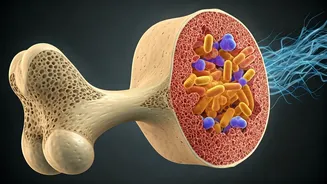The Gut-Bone Axis
The term 'gut-bone axis' refers to the intricate communication network between your gut and your skeletal system. This axis signifies that the health of
your gut, populated by trillions of microorganisms collectively known as the gut microbiome, directly impacts your bone health. These microbes influence bone density through several pathways. Firstly, they affect the absorption of nutrients crucial for bone formation, such as calcium and vitamin D. A healthy gut ensures efficient absorption of these vital elements, which is essential for maintaining strong bones. Furthermore, the gut microbiome modulates the immune system. Chronic inflammation in the gut, often related to an imbalance in the gut microbiota, can negatively affect bone health. This inflammation triggers immune responses that can lead to bone breakdown and increased fracture risk. Therefore, maintaining a balanced gut microbiome is vital for supporting healthy bones, and factors like diet and lifestyle can play a pivotal role in this process.
Nutrition: Bone’s Fuel Source
Nutrition serves as the foundation for bone strength, acting as the primary energy source that fuels the skeletal system. Your dietary choices have a profound impact on bone health, with specific nutrients playing a crucial role in bone formation and maintenance. Calcium is perhaps the most well-known of these. It's a key structural component of bones, contributing to their density and strength. Adequate calcium intake is crucial at all life stages, especially during childhood and adolescence when bones are actively growing. Vitamin D assists in calcium absorption, and without sufficient vitamin D, the body cannot effectively utilize calcium from food. Vitamin D deficiency is often linked to decreased bone density and a higher risk of fractures. Beyond calcium and vitamin D, other nutrients, such as phosphorus, magnesium, and vitamin K, also contribute to bone health. Phosphorus, like calcium, is a mineral that contributes to bone structure. Magnesium supports bone strength and aids in various enzymatic reactions involved in bone metabolism. Vitamin K is essential for bone mineralization and helps regulate bone turnover. A diet that is rich in a variety of these essential nutrients is necessary for maintaining strong and healthy bones throughout your life. It ensures the skeletal system receives the necessary building blocks for growth, repair, and overall structural integrity.
Predicting Density & Risk
The relationship between gut health, nutrition, and bones is complex, influencing bone density and fracture risk significantly. An imbalance in gut microbiota can lead to chronic inflammation, disrupting the delicate balance of bone remodeling. This disruption can result in decreased bone mineral density and increased vulnerability to fractures. Nutrient absorption from food becomes compromised when gut health is poor. Specifically, malabsorption of essential nutrients such as calcium and vitamin D weakens bones and heightens fracture risk. Diet plays a pivotal role in this intricate connection. A diet rich in processed foods, sugar, and unhealthy fats can lead to gut dysbiosis, exacerbating inflammation and negatively affecting bone health. Conversely, a diet focusing on whole, unprocessed foods, rich in essential nutrients, supports a healthy gut and promotes stronger bones. Individuals with gut-related issues, such as inflammatory bowel disease or celiac disease, are at greater risk of decreased bone density. Therefore, understanding and managing these factors, including dietary modifications and targeted treatments when necessary, is essential to mitigate the risk of osteoporosis and fractures. Promoting gut health helps ensure strong bones and reduces the chances of skeletal complications.
When To See a Doctor
Knowing when to seek medical advice for potential bone health issues, particularly those related to gut health, is crucial for timely intervention and preventative care. Individuals experiencing persistent digestive symptoms such as chronic bloating, abdominal pain, diarrhea, or constipation should consult a physician. These symptoms might indicate underlying gut issues that could impact nutrient absorption and, subsequently, bone health. If you have a family history of osteoporosis or fractures, it's wise to discuss your bone health with your doctor. Early screening, such as bone density tests, is very important, even if you do not have symptoms. Those who have a history of conditions such as inflammatory bowel disease, celiac disease, or other disorders that can affect nutrient absorption should also seek advice on bone health. In addition, women approaching or in menopause should consult their doctors, as hormonal changes during this time can affect bone density. Additionally, anyone who has experienced a fracture from a minor fall or trauma, or those experiencing unusual bone pain, should also seek medical evaluation. Seeking a doctor’s opinion helps to understand and manage conditions that may be detrimental to your bone health, allowing for appropriate assessments, treatment plans, and guidance on how to prevent further issues.















